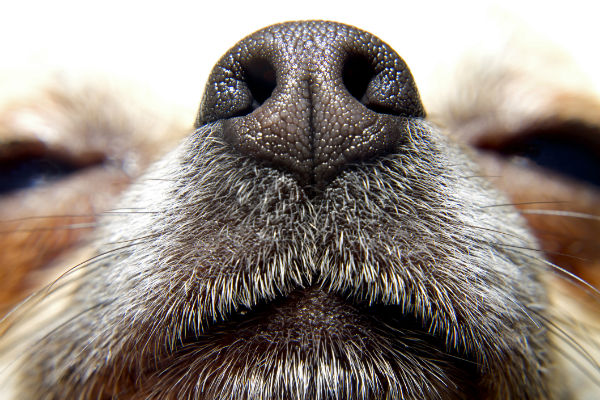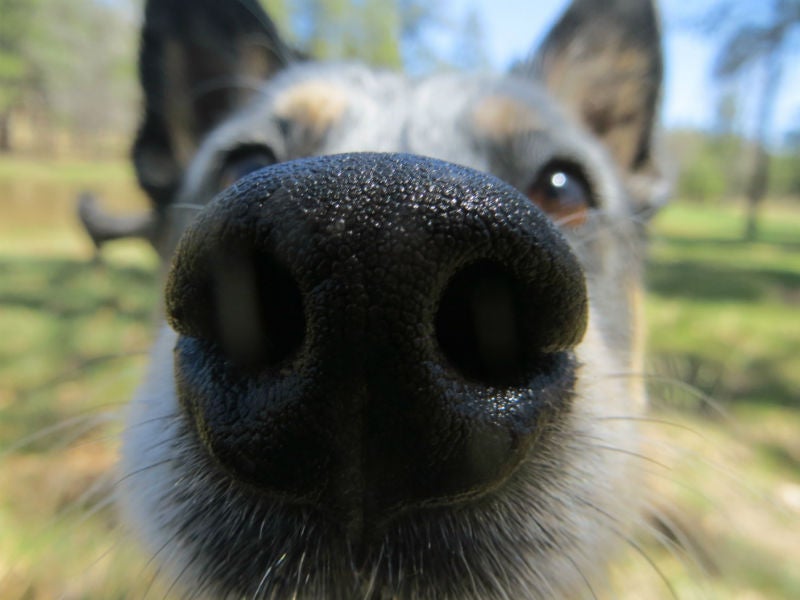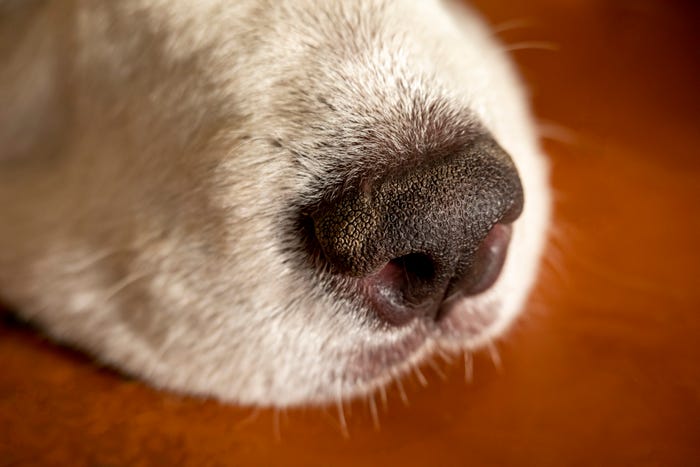If a dog’s nose is dry, it may indicate dehydration or mild illness. It’s essential to monitor for other symptoms and seek veterinary advice if concerned.
A dog’s nose being dry can be normal at times and may not always signify a health problem. Factors like weather, environment, and activity levels can affect a dog’s nasal moisture. However, persistent dryness or other accompanying symptoms may warrant further investigation.
Keeping a close eye on your dog’s overall well-being is crucial, and consulting a veterinarian for any concerns is advisable. Understanding the potential reasons behind a dry nose in dogs can help pet owners take the necessary steps to ensure their furry friend’s health and happiness.

Credit: www.akc.org
Signs Of A Dry Dog’s Nose
A dog’s dry nose may indicate dehydration, illness, or environmental factors. It’s important to monitor other symptoms and consult a veterinarian for proper diagnosis and treatment.
A dry nose in dogs can be a cause for concern for pet owners. Your furry friend relies on their sense of smell to navigate the world, so any changes in their nose’s condition should be monitored. While a moist and cool nose is typically considered normal and healthy, a dry nose may indicate an underlying issue. Let’s take a closer look at the signs of a dry dog’s nose to understand what they might mean.
Temperature
A dog’s nose temperature can provide valuable insights into their overall health. Normally, a dog’s nose is cool to the touch. If you notice that your dog’s nose feels warm or hot, it could indicate an elevated body temperature or illness. On the other hand, if their nose feels cold, it might be a sign of poor circulation or exposure to cold temperatures for an extended period.
Texture
Aside from temperature, the texture of your dog’s nose can also provide important clues. A healthy dog’s nose is usually smooth and slightly moist. However, if you notice their nose becoming dry and cracked, it could signal dehydration or sunburn. It is also possible that allergies or nasal congestion might be causing their nose to become dry and irritated. Keeping an eye on the texture of your dog’s nose can help you identify potential health issues early.
Remember, a dry nose doesn’t always indicate a serious health problem, but it is always wise to consult your veterinarian if you are concerned about your dog’s well-being. They can provide a proper diagnosis and guide you on the best course of action to ensure your furry friend stays happy and healthy.
Causes Of A Dry Dog’s Nose
A dry dog’s nose can be a cause of concern for pet owners, but it’s essential to understand the various potential reasons behind this. Here, we’ll delve into the causes of a dry dog’s nose, including weather conditions, dehydration, and allergies.
Weather Conditions
Extreme weather conditions can contribute to a dog having a dry nose. High heat or low humidity can lead to moisture loss from the nose, causing it to become dry. Similarly, cold weather or windy conditions can also impact the moisture levels of a dog’s nose. Providing appropriate shelter and hydration during extreme weather can help prevent a dry nose from these conditions.
Dehydration
A leading cause of a dry nose in dogs is dehydration. Just like in humans, insufficient water intake can lead to dryness in a dog’s nose. Physical activity, warm weather, or illness can increase the risk of dehydration. It’s crucial to ensure that your dog has access to clean, fresh water at all times, especially during warm weather or after physical exertion.
Allergies
Allergies can also play a role in causing a dog’s nose to become dry. Exposure to allergens such as pollen, dust, or certain foods can lead to inflammation and dryness in the nasal passages. Identifying and eliminating potential allergens from the dog’s environment can help alleviate the symptoms and prevent a dry nose.
Myths And Misconceptions About A Dry Dog’s Nose
Dogs are known for their cold and wet noses, which are often associated with good health. However, there are many myths and misconceptions surrounding a dry nose in dogs. Understanding the truth behind these beliefs is crucial for the well-being of our furry friends.
Nose Temperature Indicates Health
Contrary to popular belief, nose temperature alone does not indicate a dog’s health. While a cold and wet nose is typically a sign of good health, a warm or dry nose does not necessarily mean the dog is unwell. Checking the dog’s overall behavior and other symptoms is essential for a proper assessment of their health.
Dry Nose Means Illness
It’s a common misconception that a dry nose always signifies illness in dogs. Many factors, such as weather, hydration levels, or simple rest, can cause a dog’s nose to be dry temporarily. While a persistently dry nose may warrant a veterinary examination, it’s not always a cause for immediate concern.
When To Be Concerned About A Dry Dog’s Nose
A dog’s nose is normally moist, which helps them to sense their environment better. However, if you notice that your dog’s nose is dry, it may indicate an underlying issue. While a dry nose on its own may not be cause for immediate concern, there are certain instances where it is important to pay attention.
Other Accompanying Symptoms
Along with a dry nose, your dog may exhibit other symptoms that can provide further insight into their health condition. These symptoms may include:
- Excessive thirst
- Lethargy or decreased activity levels
- Loss of appetite
- Sneezing or coughing
- Discharge from the nose or eyes
- Fever
It is essential to observe your dog closely and take note of any additional signs that may indicate an underlying problem. These symptoms can help you determine whether the dry nose is a minor temporary issue or a more serious concern.
Duration Of Dryness
The duration of the dryness should also be taken into consideration. If your dog’s nose is only dry for a short period, it may be due to the weather or dehydration. In such cases, providing your dog with fresh water and ensuring they are in a comfortable environment should resolve the issue.
However, if the dryness persists for an extended period or becomes recurrent, it might indicate an underlying health condition that requires professional attention. This could include allergies, autoimmune diseases, or nasal disorders.
| Causes of Prolonged Dry Nose | Symptoms |
|---|---|
| Allergies | Sneezing, itchy skin, watery eyes |
| Autoimmune diseases | Fatigue, joint pain, weight loss |
| Nasal disorders | Nasal discharge, difficulty breathing |
If you notice any of these symptoms or if the dryness continues, it is advisable to consult a veterinarian. They will be able to conduct a thorough examination and provide appropriate treatment options.
In conclusion, a dry dog’s nose can sometimes be normal, especially during short durations or in certain weather conditions. However, when accompanied by other symptoms or if the dryness persists, it is crucial to seek veterinary advice to ensure your furry friend’s health and well-being.
How To Help Your Dog Maintain A Moist Nose
A dry nose in a dog can indicate dehydration or illness. To help your furry friend maintain a moist nose, make sure they are drinking enough water and consider using a pet-safe moisturizer to keep their nose hydrated.
A dry nose in dogs can be a common concern for pet owners. While it may not always indicate a serious health issue, a dry nose can still cause discomfort for your furry companion. Fortunately, there are steps you can take to help your dog maintain a moist nose and keep them feeling their best.
Hydration Tips
Ensuring your dog stays properly hydrated is essential for maintaining a moist nose. Here are some tips to keep in mind:
- Always provide clean, fresh water for your dog. Make sure their water bowl is replenished regularly throughout the day.
- If your dog is not drinking enough water, consider adding wet food to their diet. Wet food has a higher moisture content and can help keep them hydrated.
- Monitor your dog’s water intake, especially during hot weather or if they are engaging in strenuous activity. Encourage them to drink more if necessary.
- Consider purchasing a pet water fountain. Dogs are often more attracted to running water, which can encourage them to drink more frequently.
Moisturizing Products
In addition to ensuring your dog remains hydrated, there are moisturizing products available that can help keep their nose moist and prevent dryness. Here are a few options to consider:
- Nose balms: These balms are specifically designed for canine noses and work by providing a protective barrier to lock in moisture. Apply a thin layer to your dog’s nose as needed.
- Nose creams: These creams offer similar benefits to nose balms but often contain additional ingredients such as natural oils for added moisturization. Be sure to choose a cream that is safe for dogs and follow the manufacturer’s instructions.
- Nose-specific moisturizers: Some pet stores carry moisturizers that are specifically designed for dog noses. These products are often formulated with ingredients that promote hydration and can be a great option for dry noses.
When using any moisturizing product, it’s important to choose one that is suitable for dogs and avoid using products intended for human use.
Remember, a dry nose in dogs can have various causes, including weather changes, allergies, or certain medications. However, if you notice other symptoms accompanying the dry nose, such as nasal discharge, sneezing, or lethargy, it’s recommended to consult your veterinarian for a proper diagnosis and treatment plan.

Credit: www.akc.org
:max_bytes(150000):strip_icc()/dry-nose-french-bulldog-832974868-2000-8f2b73dc69804e5b82406e2e0ed874fe.jpg)
Credit: www.dailypaws.com
Frequently Asked Questions Of What Does It Mean If A Dog’s Nose Is Dry
Is A Dry Nose A Sign Of Illness In Dogs?
A dry nose in dogs can be caused by a variety of factors, including weather conditions and dehydration. While it’s true that a dry nose can sometimes indicate illness, it’s important to consider other symptoms and consult with a veterinarian for an accurate diagnosis.
Why Is My Dog’s Nose Dry And Warm?
A dry and warm nose in dogs can be due to environmental factors, such as sun exposure or excessive indoor heating. It can also be a result of dehydration or fever. However, it’s important to monitor your dog’s overall health and behavior to determine if further examination by a veterinarian is necessary.
How Can I Moisturize My Dog’s Dry Nose?
To moisturize a dog’s dry nose, you can apply a small amount of pet-safe moisturizer or a natural oil like coconut oil. Avoid using products with artificial fragrances or ingredients that may be harmful to dogs. Regular hydration and a balanced diet can also help maintain a healthy nose for your furry friend.
Conclusion
Having a dry nose can be a cause for concern for dog owners, as it may indicate underlying health issues. While certain factors, such as the weather or natural variations in a dog’s body temperature, can contribute to a temporarily dry nose, persistent dryness may signal dehydration or illness.
It’s important to observe your dog’s overall behavior and consult with a veterinarian if you notice any concerning changes in their nose or overall well-being. Proper care and attention can help ensure your furry friend stays healthy and happy.



